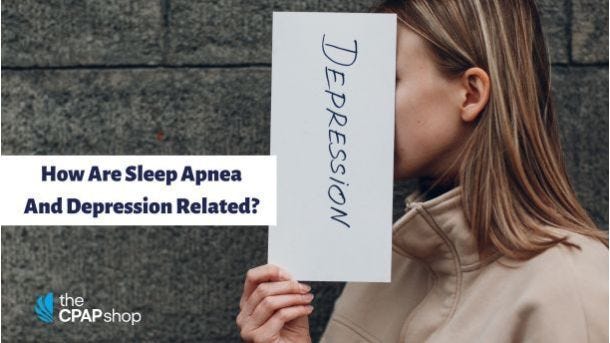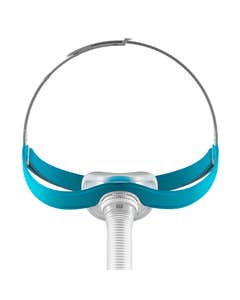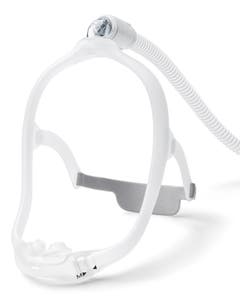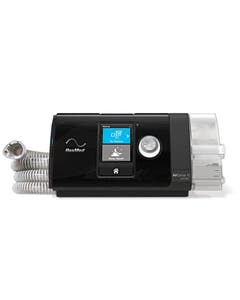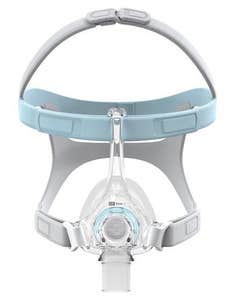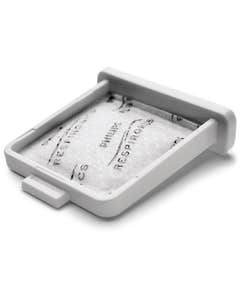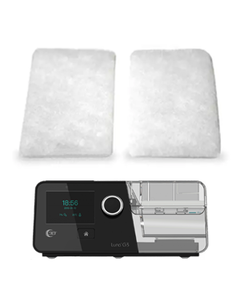How Are Sleep Apnea And Depression Related?
There are many studies about the link between obstructive sleep apnea (OSA) and multiple other negative physical afflictions. These illnesses include diabetes, obesity, and high blood pressure. It is also a consequential link to stroke, heart attack, and, most recently, cancer. In general, people with sleep apnea who either do not have a diagnosis or are non-compliant are at greater risk for complications related to their lack of sleep than people without sleep apnea. Sleep deprivation has taken on new meaning in the world of medicine. Seemingly so, it is one of the core factors contributing to overall poor health.
Yet, there have been relatively few studies researching the link between lack of sleep and mental health. Lack of sleep impacts judgment, concentration, irritability, driving, energy levels, relationships, and even sexual function. As a whole, sleep deprivation dramatically affects the overall quality of a person’s life.
Sleep Apnea and Depression
People with obstructive sleep apnea typically show symptoms of depression. These include hopelessness, being anxious, fatigue, restlessness, and overeating. Charles Bae, MD, of the Cleveland Clinic, and his team researched the link between CPAP therapy and depression. They theorized that a person afflicted with sleep apnea but now compliant with CPAP therapy would show signs of mental improvement. In conjunction with the Cleveland Clinic, nearly 800 patients filled out a standardized form. The test would assess their depressive symptoms. It is one of the largest studies to consider the effect of CPAP therapy on depressive symptoms. It is also measured by Patient Health Questionnaire (PHQ).
Similarities Between the Symptoms of Depression and Sleep Apnea
Depression and sleep apnea share similar symptoms, which can make an accurate diagnosis difficult for doctors.
Both depression and sleep apnea can:
- Leave patients feeling anxious, irritable, or moody
- Make patients feel sluggish and lacking energy even after they have recently awakened
- Cause restless sleep
- Affect cognitive ability including concentration and memory
Sometimes sleep apnea, which causes chronic sleep deprivation, can lead to feelings of depression, which can lead to a misdiagnosed case of depression. Possibly healthy sleep is what is really needed.
Doctors should consider in any case of depression to explore sleep apnea testing to ensure it is not the cause of any issues with a patient’s mental health.
Studies Supporting How CPAP Therapy and Reduced Symptoms of Depression Are Related
A recent study1 shows that depressive symptoms are extremely common in people who have obstructive sleep apnea, and these symptoms improve significantly when sleep apnea is treated with continuous positive airway pressure therapy.
Results show that nearly 73 percent of sleep apnea patients (213 of 293 patients) had clinically significant depressive symptoms at baseline, with a similar symptom prevalence between men and women. These symptoms increased progressively and independently with sleep apnea severity.
While the study reveals that improved sleep can help with symptoms of depression, it does not conclude that CPAP therapy is a cure for depression. If diagnosed with a mental illness, proper treatment in conjunction with healthy choices like getting better sleep are advised.
Can CPAP Therapy Improve Both Sleep Apnea and Depression?
The difficulty of managing both sleep apnea and depression can be daunting as both conditions may impact the other. CPAP therapy, along with more specific treatments for depression, can help with symptoms of both sleep apnea and depression.
By improving sleep through CPAP compliance, patients with depression and sleep apnea may see improvements in overall mood during the day. They may see a reduction in daytime drowsiness an increase in energy and may see a decrease in sleepless nights.
CPAP therapy can help make sleep an essential part of improving mental health while reducing the occurrences of “apneas” at night.
With improved sleep, the alertness of patients may also get better, including improved memory and concentration which may both be affected by a combination of poor sleep from sleep apnea and depression.
While providing help for both sleep apnea and depression, CPAP therapy may also help reduce other related symptoms of sleep deprivation including cardiovascular health, blood pressure, and diabetes.
Can CPAP Therapy Help Improve Your Mood?
The effect on mood is one of the most notable characteristics of continued CPAP therapy. Patients may not right away notice other physical improvements from CPAP therapy but feeling better about yourself and your day is the most apparent.
Depression and sleep loss due to sleep apnea can make contending with the day difficult and sometimes unapproachable. Work and social life can become less important and family life can often be neglected with an overwhelming feeling of “what is the use.”
With healthy sleep, however, patients are often ready to engage in their daily activities wholeheartedly. These shifts in mood can improve happiness on the job and with friends and family, which creates a compound effect that enhances well-being overall.
We often disregard the importance of sleep in our physical and mental health, which can lead to problems that are never clearly diagnosed. CPAP therapy is a simple and non-invasive approach that can help patients struggling with both sleep loss and depression.
After establishing compliance with CPAP therapy, patients were assessed again with the same PHQ. The results indicated that all patients on CPAP therapy showed signs of improvement. Patients using their CPAP machines more than four hours a night had greater score improvements than less compliant people. Another interesting point from the study’s finding was that among patients treated with CPAP therapy, married patients had a greater decrease in PHQ scores compared to single or divorced patients.
As more research complies to understand the link between the importance of sleep and the overall health of a person, the evidence points to CPAP therapy. Using a CPAP machine is a critical factor in reversing the negative effects of sleep deprivation. With depression being an incredibly complex and debilitating disease, the evidence suggests strongly that depressive symptoms improve in patients with sleep apnea who use a CPAP machine consistently.
References
- CPAP therapy reduces symptoms of depression in adults with sleep apnea. American Academy of Sleep Medicine.
There are many studies about the link between obstructive sleep apnea (OSA) and multiple other negative physical afflictions. These illnesses include diabetes, obesity, and high blood pressure. It is also a consequential link to stroke, heart attack, and, most recently, cancer. In general, people with sleep apnea who either do not have a diagnosis or are non-compliant are at greater risk for complications related to their lack of sleep than people without sleep apnea. Sleep deprivation has taken on new meaning in the world of medicine. Seemingly so, it is one of the core factors contributing to overall poor health.
Yet, there have been relatively few studies researching the link between lack of sleep and mental health. Lack of sleep impacts judgment, concentration, irritability, driving, energy levels, relationships, and even sexual function. As a whole, sleep deprivation dramatically affects the overall quality of a person’s life.
Sleep Apnea and Depression
People with obstructive sleep apnea typically show symptoms of depression. These include hopelessness, being anxious, fatigue, restlessness, and overeating. Charles Bae, MD, of the Cleveland Clinic, and his team researched the link between CPAP therapy and depression. They theorized that a person afflicted with sleep apnea but now compliant with CPAP therapy would show signs of mental improvement. In conjunction with the Cleveland Clinic, nearly 800 patients filled out a standardized form. The test would assess their depressive symptoms. It is one of the largest studies to consider the effect of CPAP therapy on depressive symptoms. It is also measured by Patient Health Questionnaire (PHQ).
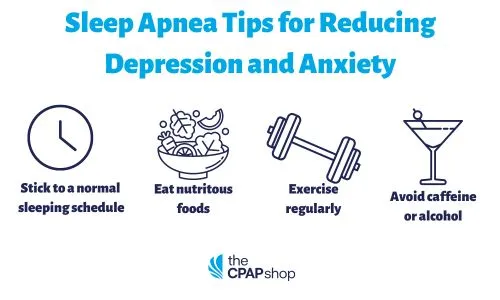

Similarities Between the Symptoms of Sleep Apnea and Depression
Depression and sleep apnea share similar symptoms, which can make an accurate diagnosis difficult for doctors.
Both depression and sleep apnea can:
- Leave patients feeling anxious, irritable, or moody
- Make patients feel sluggish and lacking energy even after they have recently awakened
- Cause restless sleep
- Affect cognitive ability including concentration and memory
Sometimes sleep apnea, which causes chronic sleep deprivation, can lead to feelings of depression, which can lead to a misdiagnosed case of depression. Possibly healthy sleep is what is really needed. Doctors should consider in any case of depression to explore sleep apnea testing to ensure it is not the cause of any issues with a patient’s mental health.
Can Sleep Apnea Cause Depression and Anxiety?
Repeatedly waking up during the night due to sleep apnea can alter brain activity and worsen a person's mood the next day. This could lead to feelings of drepession or anxiety. Because a person with untreated sleep apnea does not get a lot of sleep, their overall health in negatively affected. This includes mental health, which can take a toll when someone is not getting the adequate amount of sleep.
Studies Supporting How CPAP Therapy and Reduced Symptoms of Depression Are Related
A recent study shows that depressive symptoms are extremely common in people who have obstructive sleep apnea, and these symptoms improve significantly when sleep apnea is treated with continuous positive airway pressure therapy.
Results show that nearly 73 percent of sleep apnea patients (213 of 293 patients) had clinically significant depressive symptoms at baseline, with a similar symptom prevalence between men and women. These symptoms increased progressively and independently with sleep apnea severity.
While the study reveals that improved sleep can help with symptoms of depression, it does not conclude that CPAP therapy is a cure for depression. If diagnosed with a mental illness, proper treatment in conjunction with healthy choices like getting better sleep are advised.
Can CPAP Therapy Improve Both Sleep Apnea and Depression?
The difficulty of managing both sleep apnea and depression can be daunting as both conditions may impact the other. CPAP therapy, along with more specific treatments for depression, can help with symptoms of both sleep apnea and depression.
By improving sleep through CPAP compliance, patients with depression and sleep apnea may see improvements in overall mood during the day. They may see a reduction in daytime drowsiness an increase in energy and may see a decrease in sleepless nights.
CPAP therapy can help make sleep an essential part of improving mental health while reducing the occurrences of “apneas” at night.
With improved sleep, the alertness of patients may also get better, including improved memory and concentration which may both be affected by a combination of poor sleep from sleep apnea and depression.
While providing help for both sleep apnea and depression, CPAP therapy may also help reduce other related symptoms of sleep deprivation including cardiovascular health, blood pressure, and diabetes.
Can CPAP Therapy Improve Your Mood?
The effect on mood is one of the most notable characteristics of continued CPAP therapy. Patients may not right away notice other physical improvements from CPAP therapy but feeling better about yourself and your day is the most apparent.
Depression and sleep loss due to sleep apnea can make contending with the day difficult and sometimes unapproachable. Work and social life can become less important and family life can often be neglected with an overwhelming feeling of “what is the use.”
With healthy sleep, however, patients are often ready to engage in their daily activities wholeheartedly. These shifts in mood can improve happiness on the job and with friends and family, which creates a compound effect that enhances well-being overall.
We often disregard the importance of sleep in our physical and mental health, which can lead to problems that are never clearly diagnosed. CPAP therapy is a simple and non-invasive approach that can help patients struggling with both sleep loss and depression.
After establishing compliance with CPAP therapy, patients were assessed again with the same PHQ. The results indicated that all patients on CPAP therapy showed signs of improvement. Patients using their CPAP machines more than four hours a night had greater score improvements than less compliant people. Another interesting point from the study’s finding was that among patients treated with CPAP therapy, married patients had a greater decrease in PHQ scores compared to single or divorced patients.
As more research complies to understand the link between the importance of sleep and the overall health of a person, the evidence points to CPAP therapy. Using a CPAP machine is a critical factor in reversing the negative effects of sleep deprivation. With depression being an incredibly complex and debilitating disease, the evidence suggests strongly that depressive symptoms improve in patients with sleep apnea who use a CPAP machine consistently.
Some Sleep Apnea Tips for Reducing Depression and Anxiety
There are many tips to help reduce anxiety or stress when a person has sleep apnea. These include:
- Stick to a normal and routine sleep schedule
- Eat nutritious food daily
- Exercise regularly
- Avoid too much caffeine or alcohol
Conclusion
The CPAP Shop would be happy to help you if you are newly diagnosed with sleep apnea. Since CPAP therapy can improve feelings of depression and anxiety, it is important you are getting the best products that suit your needs to help you live better. Visit us online for top-quality CPAP products including CPAP machines, masks, and more. If you have questions or need any assistance, give our knowledgeable team a call at 866-414-9700 today!



